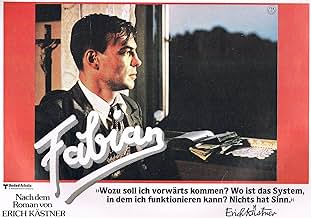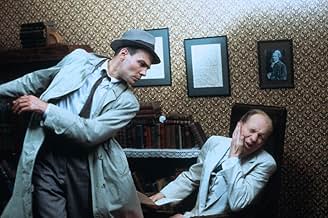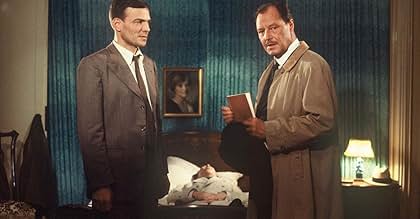Aggiungi una trama nella tua linguaNovel-based story of Jacob Fabian, a somewhat liberal Berlin advertising copywriter who witnesses the collapse of the prewar German society during the 1930s.Novel-based story of Jacob Fabian, a somewhat liberal Berlin advertising copywriter who witnesses the collapse of the prewar German society during the 1930s.Novel-based story of Jacob Fabian, a somewhat liberal Berlin advertising copywriter who witnesses the collapse of the prewar German society during the 1930s.
- Premi
- 1 vittoria e 1 candidatura
Cristel Braak
- Vera
- (as Christel Braak)
Gunter Berger
- Münzer
- (as Gunther Berger)
Trama
Lo sapevi?
- QuizFinal film of Helma Seitz.
- ConnessioniVersion of Fabian - Going to the Dogs (2021)
Recensione in evidenza
Fabian is the story of modern Germany between two wars and two ideals. It is written in a witty, bitter-sweet and unpretentious style and same goes for this film. What we are presented with in both formats is a nation in turmoil, that has lost its pride (they lost world war I), has no money (Germany was forced to forward awful amounts of reparation-payments to half of Europe after WWI), growing anger about those payments and a lack of orientation (politicaly). It reminds us of such talents as Tucholsky, Zweig, Brecht, Weill, Eisler and other big names from that time and space. This is big city elegance and decadence close to the eve of destruction but self control and reason-ability are still functioning halfway and it looks as though Fabian and his likes are to blame for what was to come soon enough. By remaining cool and rather inactive or disinterested in politics without being politically ignorant he, as millions of others, involuntarily helped the Nazis make it big although they must have sensed the danger ahead. It is obvious, that he had no future and therefore had to die. Fabian is a metaphor for Germany itself. Who wants to state whether the films captured that presumably very peculiar atmosphere of 1920/1930's Berlin? I can't since I was born too late to know. But the overall decadence, political struggles and carelessness are very present. The film walks on a tightrope by blending a basic up beat feel of carelessness with the harsh realities of crazy times in the bad sense of the word. The films isn't really displaying free form abstractions or personal interpretations as we would expect from highly profiled filmmakers. It follows the book and shows lots of respect to Mr Kästner, which I find OK. This film documents history and drastic political struggles on a very personal level. It makes history touchable and understandable. Mr Kästner originally intended to write books about the times when the Nazis ruled over Germany and noted lots of information in his personal journals/diaries but in the end he was too appalled by it all to go ahead and transform his notes into printed format.
- marc-fehlmann
- 18 set 2006
- Permalink
I più visti
Accedi per valutare e creare un elenco di titoli salvati per ottenere consigli personalizzati
Dettagli
Contribuisci a questa pagina
Suggerisci una modifica o aggiungi i contenuti mancanti
























